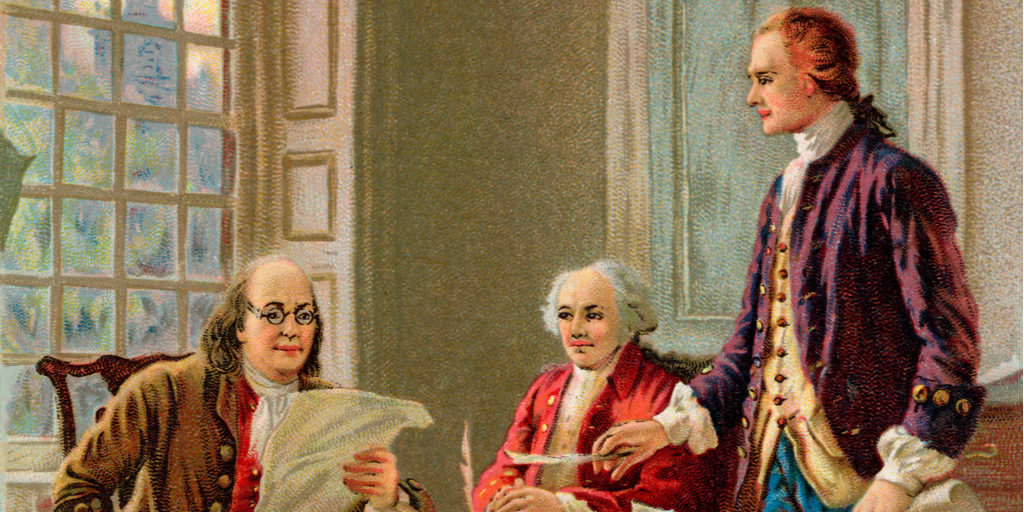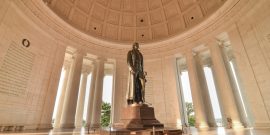For the first time in almost two hundred years, the greatest statue of George Washington can be viewed again in the United States.
Restoration Versus Rupture: How Did the Founders Understand History?
On the eve of American Independence, when the colonists were asked to choose between violent resistance or submission, Patrick Henry explained how he arrived at his choice: “I have but one lamp by which my feet are guided, and that is the lamp of experience. I know of no way of judging the future but by the past.” A dozen years later, Americans were faced with another momentous choice, and James Madison, writing as Publius, could recommend no better method for deciding whether to adopt the Constitution. In Federalist 20, he emphasized that experience—even the secondhand experience derived from reading histories—is the “oracle of truth” in political matters.
Trevor Colbourn both explicates and complicates the Founders’ frequent paeans to the enlightening effects of history in The Lamp of Experience: Whig History and the Intellectual Origins of the American Revolution, a book the late Penn State and Indiana University historian published in 1965 and republished in a Liberty Fund edition in 1998. The word “history,” Colbourn reminds us, has two distinct meanings. It may mean the actual events of the past, or it may refer to the narrative tapestry that historians weave around those events. And historians may have partisan reasons for weaving political lessons into their respective tapestries, resulting in a narrative that may be a poor or distorted reflection of the actual historical events it purports to relate.
In examining the Revolution, Colbourn is interested in the use of faulty narrative histories by leading political actors when justifying their political choices—momentous choices that would make actual history. He seeks to understand the intellectual world the revolutionaries inhabited, in part, by compiling inventories of what they read. He pores over book lists of their various libraries: academic, private, and subscription. As it happens, the colonists were voracious readers of history. They consumed all manner of it, but they especially enjoyed reading histories of England. And to read English history in 18th century America was to absorb the political lessons threaded into the narratives woven by the “Real Whigs”—written by the likes of Obadiah Hulme, Catherine Macaulay, and that martyr to Whig history, Algernon Sidney.
Saxon Purity Versus Norman Corruption
The Real Whigs (or True Whigs) got their name from their penchant for disparaging as corrupt and unworthy of the title the actual Whigs in power. Whig historians viewed the institution of Parliament as the sole legitimate source of power, a legitimacy that stretched back to time immemorial. According to this narrative, even the king derived his legitimacy from the consent of Parliament. The true origins of the English constitution, said the Real Whigs, rested in their Saxon forebears, if not earlier, whereas feudalism was a relatively recent innovation (a corruption, really) imported in 1066 by the Normans.
History after 1066, according to the Real Whigs, became a constant struggle in England to restore the liberties they had lost. The Stuart Kings were reviled because they tried to rob the English of their ancient rights and customs. The Hanoverians, on the other hand, were honored because (once again instituting a monarchy that governed by consent) they promised to restore these ancient rights and customs. Unfortunately, Parliament became lazy and corrupt under Hanoverian rule. The True Whigs wished to restore not only the political purity they believed was lost but also the moral purity that had presumably eroded over time.
The Whig interpretation of English history was not the only game in town; there were rival interpretations. That of the Tories, which Colbourn stresses was generally more accurate by the strict standards of historiography, did exist; the Tory interpretation was simply far less popular. The leading figure of this rival version of history (and the bête noire of those championing the Whig version) was David Hume, who penned a pro-Stuart history of England. (This, too, was published by the Liberty Fund, in a handsome six-volume edition in 1983.) According to John Adams, Hume wrote “elegant lies” about English history; and Thomas Jefferson believed that students at the University of Virginia could only be exposed to the noxious charms of Hume after they had been thoroughly inoculated by sound Whig historians.
From Restoration to Rebellion
The political program of the True Whigs was reformation through restoration—a process that had been a constant struggle in England since the Normans had upset their proud legacy of historic liberties. Sir Edward Coke taught that Magna Carta was “no new declaration,” but rather a restoration of ancient liberties established in the common law.
At first, the American appeals to history were similarly conservative: The colonists wished to restore a golden era that preceded recorded history. It would not be true to say (with a nod to Hamlet) that the British constitution had been more honored in the breach than the observance, since every breach had led to increasing dishonor. Nevertheless, the constitution throughout its history had been honored by the readiness of liberty-loving Englishmen to resist every breach. It was the constitution that the English have repeatedly strived for—in Magna Carta, in the Glorious Revolution—rather than the one they lived under, to which the Americans appealed. Indeed, many colonists believed that the British constitution already existed with greater purity in America than in the Mother Country. “England,” said John Dickinson, “must be saved in America.”
But in time, the colonists despaired of achieving reformation through mildly petitioning for their ancient rights. The mother country lacked sufficient virtue to defend her own liberties, much less those of her children. Thus did they embrace a total rupture with their historical lineage as the only road to its restoration. Since the object of the English Whig historians was reformation, not revolution, the Americans were here learning a lesson that their instructors never meant to teach.
Natural Rights and Historical Rights
The exposition Colbourn unfolds in The Lamp of Experience is interesting, compelling, well documented, and a joy to read. Yet one cannot help but think there are other aspects of this history that are either being downplayed or left out altogether in this telling. In particular, how do we situate these many appeals to British history within the larger context of the American appeals to natural rights?
In the Introduction, Colbourn explains that “the political philosophy of the Revolutionaries is familiar; their historical justification for independence is not.” If the book is read in this light—as a necessary adjunct to fill in the gaps left by the exclusive focus on America’s ideological origins—then it performs a useful and even necessary function.
And it would be misleading to suggest that Colbourn entirely ignores the role of natural rights. In several key places, he shifts his gaze from the colonists’ preoccupation with their inherited rights as Englishmen to their claims based on rights that existed independently of the Anglo-Saxon experience. Indeed, he points out that many colonists revered the British constitution precisely because it embodied rights that were given by God or by nature.
Still, there are several other key places where Colbourn argues that history was of greater importance than nature when leading figures were defending their rights, and he fails to convince that this priority is a faithful reflection of the actual history.
Perhaps most telling are the author’s attempts to prioritize historical rights over natural rights in the mind of Jefferson. For instance, he claims that Jefferson’s 1824 letter to John Cartwright “reveals anew Jefferson’s lasting commitment to the whig view of English history.” Spanning one-and-a-half pages of text, Colbourn quotes numerous passages from the Jefferson-Cartwright correspondence to show just how enduring was Jefferson’s commitment to that view of history, nearly a half-century after he penned the Declaration of Independence. However, Colbourn entirely skips over what appear to be the letter’s most important lines.
Jefferson was thanking the Englishman for sending copies of the history that he (Cartwright) had written. However, Jefferson interrupted his encomia to Whig history to impress upon his correspondent America’s important departure from it: “Our revolution commenced on more favorable ground. … we had no occasion to search into musty records, to hunt up Royal parchments, or to investigate the laws & institutions of a semi-barbarous ancestry. We appealed to those of nature, and found them engraved in our hearts.”
In other words, although Jefferson did endorse and praise Cartwright’s Whig interpretation of English history, the essential message of his letter was to disassociate the American Revolution from that narrative. It would be misleading to claim, on the basis of this letter at least, that the appeal to historical rights was more important than natural rights for most of America’s leading Revolutionaries.
The Role of Myth in Philosophy and History
The main purpose of The Lamp of Experience is to explicate the role of history in the American Revolution. But in some ways, its more interesting contribution is to question the role of myths (in particular, in the present instance, what Colbourn calls the “Saxon Myth”). It is for this reason—the persistence of the “Saxon Myth” in the minds of the Founders—that it becomes necessary to ascertain whether nature or history was more important to the Americans when justifying their break from England.
Historians, if they are true to their calling, must ground all of their assertions in historical fact; to stray into the realm of the mythical is simply to write bad history. Political theorists and philosophers, on the other hand, have often relied on myths, utopias, and historical fiction to make up for the limitations of dialectic. As the example of Socrates shows, sometimes there is no better substitute than well-wrought fiction for plumbing the depths of important truths about political life and the human condition. The Myth of Er has long been a staple of political insight and reflection. The same is true of Aristotle’s best regime, William Shakespeare’s historical plays, Daniel Defoe’s Robinson Crusoe, and John Locke’s state of nature. The importance of these accounts is not diminished if it be shown that they have never existed in historical fact or if they are, at best, partially fictionalized accounts of history.
This is why it becomes essential, when weaving a narrative tapestry of the American Revolution, to determine whether the Americans grounded their claims of right primarily on a historical or a natural basis. If the American colonists understood themselves as primarily defending ancient rights that they inherited as Englishmen, and their understanding of the British constitution was mythical (nothing but bad history), then the American Revolution was little short of a farce.
If, on the other hand, Americans understood themselves primarily as defending rights that were God-given and based in nature, then it was of little importance that they might have been mistaken about the degree to which these rights were codified in the ancient British constitution.
Colbourn never delves deeply into the potentially legitimate role that myth might play in political discourse and choice. However, he does begin to raise the question in his conclusion, suggesting that “ ‘wrong history’ may well have been a great political advantage to England, if not to her historical erudition.” Whig historians may have provided liberty “with the steadying alliance of history and tradition.” If so, “it is possibly the world’s misfortune that myths are becoming intellectual curiosities.”
Colbourn’s closing reflections seem more like an initial foray into a fruitful inquiry about the role of myth in politics than its consummation. For it is hard to believe (as the author seems to suggest) that all myths are of equal value when defending liberty, or that their value lies in their imagined antiquity alone. In a fake-news, post-truth era, it is perhaps the world’s misfortune that we are losing the ability to distinguish between true myths and false ones.



